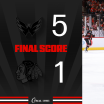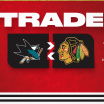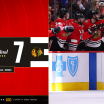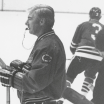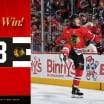Hockey bags once slung over shoulders fell to the ground as old friends and teammates hugged each other, smiles stretched across their faces. Even injured teammates in knee braces strolled through the doors of Fifth Third Arena to join the experience as women of ranging ages lined up to take their professional headshots with their tie-dye jerseys before heading off to their specified locker rooms. There it sat, right next to the Blackhawks hockey stick throne and logo: a large, shining silver trophy with "Breaking Barriers" emblazoned on the bottom.
Yet, as coveted as it was, the trophy was not the players' main priority for the weekend, nor that of the Blackhawks organization. Rather, the inaugural Breaking Barriers Tournament held this past weekend--which just so happened to overlap with the 50th anniversary of Title IX and Chicago's Pride weekend--was focused on the growth of women's hockey and celebrating the community it provides for women of all different backgrounds and skill levels.
FEATURE: Breaking Barriers Tournament Making Strides in the Women's Game
Three-day event brought teams from across midwest to Fifth Third Arena for a competitive tournament
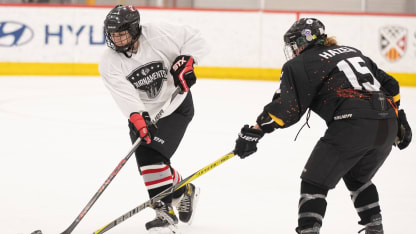
© CHASE AGNELLO-DEAN
The tournament, hosted in the official practice facility of the Blackhawks, welcomed three women's divisions at various levels of hockey experience, as some had been stepping onto the ice for the first time in quite some time while others, as overheard from one participant upon entering, "played in college and had to come back for more."
"This was probably the best tournament I've ever played in, to be honest, because it's fun and everything was well put together," Jen Ma said. Ma plays with the Tigers Women's Hockey Club out of Evanston, or Tigerhawks, and has been playing hockey since she moved to Chicago in 2004. "I think it's awesome because there's so much emphasis on youth hockey, and not a lot on adults who have never played before in their lives. There's just so much interest out there, because so many people who come watch the game are like, 'That looks like fun, I want to try it.'"
Along with the tournament, the teams attending--which ranged all over the Midwest as well as two teams making the trip from Colorado--also got special tours of Blackhawks facilities and locker rooms, as well as other events such as cocktail hour meet-and-greet with Team USA forward and Olympian Abbey Murphy on Saturday night.
"The opportunities were really neat, like going to see the where the Blackhawks train and the locker room," said Zoya Sirota, another member of the Tigerhawks who just learned to play five years ago. "We wouldn't get that opportunity at another tournament, unless you're playing a super-high tier, but it's nice to see."
The weekend started bright and early Friday morning with two "Coffee and Learn" clinics, which included instruction from former Blackhawk and 2010 Stanley Cup Champion Ben Eager along with Team USA U-18 forward Kelly Gorbatenko.
"I think it's great to grow the women's game and the Hawks using their platform really showcases it, so it's nice to just be a part of that," Eager said. "We can see the different levels and then see what they want to work towards so that everyone feels comfortable."
While Gorbatenko was younger than a considerable amount of the weekend's players, she said she was more than happy to help add to the game that has given her so much.
"It's about getting the older women involved so their kids can also get involved, getting more people on the ice and more people into hockey to just grow the game," Gorbatenko said. "It's nice to be able to kind of give back and be able to share my experiences."
The Breaking Barriers Tournament offered a special opportunity for female hockey players to develop their skills alongside those of varying skill levels, an element of bringing-together that is not often included in adult tournaments, especially because women's tournaments themselves are few and far between. According to Bri Kerbuski, who participated in the weekend as part of a free agent team, most women's tournaments are actually just side components of men's tournaments, and teams like the Chicago North Stars usually compete against men's teams on a regular basis due to lack of other opportunities.
"That's not necessarily the most barrier-free entry into the sport because a lot of times, women don't want to the go to a men's tournament and be intimidated by men's teams, which is there's definitely a very different culture within the women's divisions," Kerbuski said. "Having one where its exclusively women, and then starting with one that sets the foundation that is an educational thing really brings people in because you're setting the narrative that we want to grow, we want to develop. I saw some younger kids here too, so showing them that we see you: you have female Olympians, you have female coaches, and you're showing up that there is a pathway in the sport and it's not a dead-end opportunity."
For another free agent, Meredith Shields, the fact that beginner, intermediate and advanced levels were all welcome to participate in Breaking Barriers was empowering for women's hockey.
"The fact that there were so many different options and playing levels, it just creates more of a community where doesn't matter if you're good or not, because if you love the sport, that's enough," Shields said. "I think hockey has been a more of an upcoming sport for women in the last couple years, so it's good to just get it on a level playing field."
For many of the women in attendance, including Noel Buican of the beginner Love Me Littles, the weekend was a great opportunity to get to know other people that appreciate the game of hockey.
"It was important to be to play in this, because I'm not a great player, but it's fun," Buican said. "I love this community of women, it's a great dynamic for women who maybe don't feel comfortable in the traditional community of women. It's a place where there's a lot of clarity and honesty, you can be yourself and we don't have to sugarcoat."
But more than anything, the Breaking Barriers tournament was all about having fun and making the game of hockey exciting for women of any age. For former Loyola University-Chicago women's hockey head coach and current hockey official Sonya "Sam" Malinowski, who refereed games over the three-day event, that's what makes it accessible to all--so much so that she started doing the "Cha-Cha Slide" following one of the games, as players from teams swarmed the ice to participate in the infamous line dance.
"It's one of those things that like you're competitive here, but you can also have fun and that's what hockey is all about," Malinowski said. "Balancing that bond and that competitiveness across the board, that's what keeps people retained in the game. If it's fun, you have a community of women that smile and want to support each other."





